Research
Research interests: Pragmatics, syntax, prosody, discourse particles and interjections, interactional linguistics, conversation analysis, multimodal communication, sociolinguistics, dialectology, first language acquisition, cross-linguistic research
Current projects
Language acquisition and sociolinguistic variation: A longitudinal study on the acquisition of n-apocope in Alemannic
Funded by the Research Innovation Fund of the University of Freiburg from 05/2020-04/2021
This project deals with the role of linguistic variation in first language acquisition. Using the example of n-apocope (deletion of -n, for example in mache ‘machen’, Engl. ‘make’) in Alemannic, a dialect of German, we investigate how young children between approx. 1,5 and 4 years of age acquire the phonological properties of their dialect while being simultaneously exposed to the Standard German variety (in which n-apocope does not occur). We draw on LEKI (Longitudinalkorpus Eltern-Kind-Interaktion), a longitudinal audiovisual corpus of spontaneous interaction that documents how young children use Alemannic in the family context. On the one hand, the project will shed light on the acquisition of Alemannic in Southwestern Germany. On the other hand, we will continuously extend the longitudinal corpus, creating a data base for future research on language acquisition and parent-child interaction.
Interactional Linguistics - Discourse particles from a cross-linguistic perspective
Scientific network, from 10/2018-09/2021, financed by the German Research Foundation
![]()

Coordinators: Dr. Martin Pfeiffer, Dr. Katharina König (University of Münster)
Network members: Prof. Dr. Arnulf Deppermann (Mannheim), Dr. Oliver Ehmer (Freiburg), Dr. Sonja Gipper (Köln), Alexandra Groß (Bayreuth), Dr. Aino Koivisto (Helsinki), Dr. Uwe Küttner (Mannheim), Prof. Dr. Xiaoting Li (Edmonton), Dr. Michal Marmorstein (Jerusalem), Prof. Dr. Yael Maschler (Haifa), Dr. Florence Oloff (Oulu), Prof. Dr. Beatrice Szczepek Reed (London), Dr. Yazgül Simsek (Münster), Kathrin Weber (Münster), Dr. Jörg Zinken (Mannheim)
External experts: Dr. Mark Dingemanse (Nijmegen), Prof. Dr. Barbara Fox (Boulder), Prof. Dr. Makoto Hayashi (Nagoya), Prof. Dr. Kyu-hyun Kim (Seoul), Prof. Dr. Jan Lindström (Helsinki), Prof. Dr. Jakob Steensig (Aarhus), Prof. Dr. Tanya Stivers (Los Angeles), Prof. Dr. Ryoko Suzuki (Tokyo)
Student Assistant: Hannes Kurz
The scientific network "Interactional Linguistics" examines particular types of discourse particles – that is, words (and fixed phrases that behave similarly) that are used to organize, maintain, or regulate interaction between speaker and recipient – from a comparative-linguistic perspective. We focus on question tags (e.g. isn’t it?), response particles (which provide answers to questions, e.g. yes or exactly), and repair markers (e.g. uh or no) in a set of typologically diverse languages, namely, the spoken variants of Czech, English, Finnish, French, Low and Standard German, Hebrew, Mandarin Chinese, Polish, Spanish, Turkish, and Yurakaré. The network takes the communicative tasks of questioning, responding, and initiating repair as a starting point. As these tasks prove to be similar across speech communities, and must be accomplished regularly by interlocutors, our focus on particles as specific linguistic means for performing these tasks provides ideal grounds for identifying potentially generic linguistic resources of human social interaction, and for exploring the extent of possible language-specific variation. More specifically, our aim is to explore
i) the array of particles the different languages provide for these communicative tasks, and the different functions these particles have in each of the languages studied,
ii) whether there are recurrent particles that are used cross-linguistically for these tasks, e.g. phonetic variants of huh as question tags, of hm as response particles, or of uh as repair markers, and
iii) the relationships between the three different types of particles.
On the one hand, question tags and response particles occur within the same sequential environment (question-response sequences), which allows for the investigation of possible co-occurrences of certain question tags and response particles across languages. On the other hand, comparing all three types of particles in each language, we will be able to explore relationships between them, e.g. regarding the existence of polyfunctional particles in the two different conversational systems, that is, sequence organization (question tags, response particles) and the repair system (repair markers). Through this approach, the network hopes to gain insights into how these types of discourse particles are organized across languages, and how they are used for accomplishing certain generic interactional tasks.
Exclamations in interaction: Formal, functional, and visual aspects
Financed by the Research Innovation Fund of the University of Freiburg from 02/2016-03/2017 and by a Postdoctoral Fellowship for Leading Early Career Researchers of the Baden-Württemberg Stiftung from 05/2017-12/2020
Principal investigator: Dr. Martin Pfeiffer
Research assistant: Marina Anna, M.A.
Student assistants: Matilda Jelitto, Annika Sturm
Completed projects
Effects of the national border on the linguistic situation in the Upper Rhine area (Frontière linguistique au Rhin Supérieur, FLARS)
04/2012-03/2015, funded by the DFG (Germany) and ANR (France), collaboration between the University of Freiburg and the University of Strasbourg/France, principal investigators: Prof. Dr. Peter Auer, Prof. Dr. Dominique Huck
02/2009-09/2014, PhD project
This study from the field of interactional linguistics comprehensively describes and explains the structure of self-initiated self-repair in German. Based on over 2,500 self-repairs from spontaneous audio recordings, it develops a highly predictive model that explains the syntax of self-repair (that is, the point of interruption and the destination of recycling) as the outcome of a struggle between mutually competing factors.
Doctoral thesis: Pfeiffer, Martin (2015): Selbstreparaturen im Deutschen. Syntaktische und interaktionale Analysen. (Linguistik - Impulse & Tendenzen 68.) Berlin/Boston: de Gruyter.
First supervisor: Prof. Dr. Peter Auer, second supervisor: Prof. Dr. Stefan Pfänder
Speaking to an Outsider - Speaking as an Outsider
04/2010-09/2013, conversation analytic research project, principal investigator: Prof. Dr. Gene Lerner, UC Santa Barbara
Syntax of Spoken Swedish and German
01/2008-12/2009, DAAD research project, exchange between the German Department at the University of Freiburg and the Department of Scandinavian Languages and Literature at the University of Helsinki, principal investigators: Prof. Dr. Peter Auer, Prof. Dr. Jan Lindström
Powered by CMSimple| Template: ge-webdesign.de| Login

 Germanistische Linguistik Freiburg
Germanistische Linguistik Freiburg


